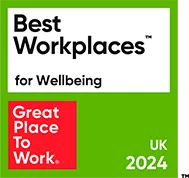Technological advancements, introduction to a new generation to the workspace and economic uncertainty– it is time to plan for what the future holds for your organisation and for your most valuable asset, your people.
In this constant evolution of the workspace which started with the pandemic there is one thing that we learned as managers – organizations who place employees at the heart of their digital transformation today will be the market leaders of tomorrow. People are demanding more from their employers—and technology is essential to seizing the opportunity to evolve your organization.
An innovative and future – ready workspace requires a modern outlook and a solid strategy to rethink how work gets done.
So, what does the workplace of 2023 look like?
In this blog, I will try and explain five characteristics that will define the workplace of 2023.
1. Hybrid work is here to stay
Today, where you are located is starting to matter much less when it comes to being able to do your job. With 75% of hybrid or remote employees agreeing their expectations for working flexibly have increased, there is no doubt that the future is hybrid. Managers must understand that it is about accessibility, not presence! Getting the right people connected to do the work that needs to be done. Flexibility around how, where, and when people work is no longer a differentiator, it’s now table stakes. There is plenty of technology to support remote work, but sometimes you just need to get people face-to-face to unlock the creativity and innovation needed to solve tough problems.
At Olive Jobs we give a choice! Working from the offices is not mandatory and employees have a choice to decide from where they will be most creative. Some of our team members are working from home and some are working from the offices. We understand that social interaction is important – and that’s why each month we have team buildings that are usually outdoor and creative.
2. Great Resignation: There is shortage of critical talent
Managers and leaders are under more pressure than ever to fill roles with those with critical skills to meet market needs and drive organisational changes.
Recently, PwC launched its “Global Workforce Hopes and Fears Survey 2022” at the World Economic Forum in Davos, which surveyed more than 52,000 employees in 44 countries. According to them one in five employees are saying they are likely to switch jobs in the next 12 months. The consulting firm said in a press release that higher pay, more job fulfilment and wanting to be “truly themselves” at work are the factors pushing employees to change jobs.
Even if it seems like that the more money is the biggest motivator for a job change yet finding fulfilment at work is “just as important,” according to PwC. Some 71% of survey respondents said a pay increase would prompt them to change jobs, yet 69% said they would change employers for better job fulfilment too. People leave managers not a company.
The people want a workplace that allows them to truly be themselves too, with 66% of those surveyed indicating this as an important factor.
In a scenario like this one, what can business leaders and managers do to retain their staff during the great resignation?
As a general manager at Olive Jobs, we have practice of listening to our employees, encourage them to take initiatives, leave them to be creative, couch them to become A players, involving them to a problem-solving environment and reward them for being ambassadors of our FIT Culture (Family, Impact, Teaming).
Embracing professional development, motivating, and inspiring every day are one of the key elements of keeping our team happy.
3. Technology and digital transformation
Data, cloud, automation, video, collaboration platforms and other technologies are changing the way we work and live.
The pandemic has significantly accelerated digital transformation, and companies are investing more in digital technologies like artificial intelligence (AI) and the internet of things (IoT). As a result, almost every company now requires digital skills from its existing and new employees, even in business-related roles. Employees need to focus on improving their digital skills to better prepare themselves to work together with digital technology. From the employer’s perspective, they should not approach digital transformation as replacing humans with technology; instead, they should see it as a way of enhancing how people work.
At Olive Jobs using the digital technologies is the curtail part of achieving our goals. Not just to follow the productivity but also to drive the business forward. Technology allows us to simplify the processes, to define the KPI’s and to create a multiskilled environment where each of our people can see the added value of their work.

4. Millennials in the workplace
By 2025, millennials are expected to make up about 75% of the workforce. They are, by all accounts, going to be the largest generation ever to enter the workforce.
As proud member of Millennials, my generation moved into leadership positions in our organizations and organizations around the world. According to many research, my generation and Gen X are creating workplaces that celebrate independent, autonomous self-starters.
We are a generation of employees with technological fluency who are willing to live at home longer until we find a company that we truly want to work for.
In other words, organisations must shift and create an environment where people would want to work.

5. Mental Health
Another trend that is having the spotlight in 2022 and beyond is the increasing focus of employers on employee well-being. Employee well-being and mental health are being considered as the top priority by 68% of HR executives, according to the future workplace 2021 HR sentiment survey.
Employers now understand the impact of mental health and the well-being of the workforce on productivity. Since the pandemic, and acceleration of digital, employees expect and need more from their employers regarding their well-being.


